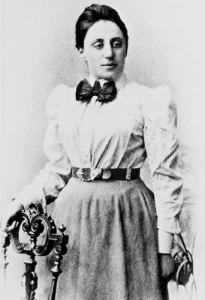WOMEN IN SCIENCE
“Science makes people reach selflessly for truth and objectivity; it teaches people to accept reality, with wonder and admiration, not to mention the deep awe and joy that the natural order of things brings to the true scientist.”- Lise Meitner
WOMEN WHO DESERVED A NOBEL PRIZE IN SCIENCE
This week Kectil honors women who made significant contributions to science. We start with two women who contributed to science sufficient to receive Nobel Prizes for their work but were not awarded. Today we will focus on Emmy Noether. Tomorrow we will discuss Lise Meitner. So, let us now spend a few days honoring these two brilliant women who contributed to our fundamental understanding of our world.
Emmy Noether- German Mathematician

Albert Einstein called Emmy Noether the most significant and creative female mathematician of all time. Many physicists acknowledge that she contributed some of the most important fundamental mathematical explanations about how our world works. In 2012, The New York Times published an article on “The Mighty Mathematician You’ve Never Heard of”. Noether’s Theorem, which was published in 1918, states that every differentiable symmetry of the action of a physical system has a corresponding conservation law (get that???). Her Theorem unites two pillars of physics: symmetry in nature and the universal laws of conservation. One conclusion of her mathematical proofs is that the invariance of time produces the law of conservation of energy. Some consider Noether’s Theorem as important as Einstein’s theory of relativity. It undergirds much of today’s top research in quantum physics. Yet Noether herself remains unknown, not only to the public but even to many members of the scientific community.
Born on March 23, 1882 in Bavaria Germany, Amalie Emmy Noether had to overcome several handicaps. She was a female professor at a time when German universities did not hire female professors and she had to work at the Mathematical Institute of Erlangen without pay, from 1908-1915. She joined the Mathematics Department at the University of Göttingen in 1915 and lectured students for four years under a man’s name. She was given the title ‘Privatdozent’, which permitted her to lecture in 1919, but she was still not paid. In 1922, she finally became an Associate Professor receiving a menial salary for her service. Despite her brilliant work, she was not given the status of a Professor because she was a woman, a Jew and a social democrat.
In 1915, Einstein published his general theory of relativity. Noether began applying her invariance work to some of the complexities of the theory. That eventually inspired her to formulate what is now called Noether’s Theorem, an expression of the deep tie between the underlying geometry of the universe and the behavior of the mass and energy that call the universe home.
When Nazis took over, it became very difficult for her to continue to teach. She was forced out of the University as a Jew yet continued to teach students out of her home. She was known for including even those students who had joined the Nazi party in her home lectures because of her love for mathematics. In 1933, with the help of Einstein she moved to the U.S and taught at the Bryn Mawr College in Pennsylvania as a guest professor. She was paid a full salary and was accepted as a proper faculty member. She also taught at the Institute of Advanced Study at Princeton.
Noether was awarded the Ackermann-Teubner Memorial Prize in Mathematics in 1932
Noether died in 1935, after an ovarian tumor operation. After her death, Albert Einstein commemorated her in a letter to the New York Times, writing, “In the judgement of the most competent living mathematicians, Fraulien Noether was the most significant creative mathematical genius thus far produced since the higher education of women.”
For her exceptional contribution to our understanding of the basic framework of the universe, Kectil now awards Amalie Emmy Noether a Kectil Laureate Prize!

